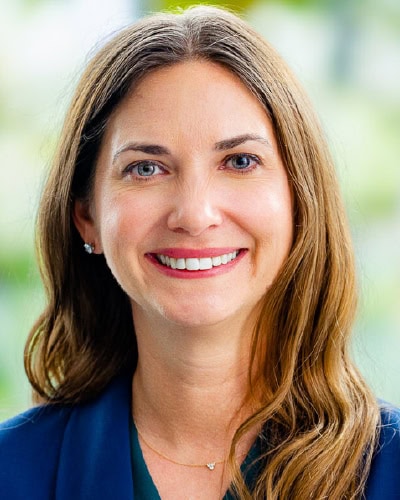Bringing Supply Chains to Breakthrough Research and Science

Allison Bennett Irion brings deep expertise in defense, government, and supply chain strategy to her work at Argonne National Laboratory. Learn how she’s helping shape the future of critical materials and science-driven logistics.

Allison Bennett Irion is director, supply chain research for Argonne National Laboratory (ANL)
RESPONSIBILITIES: Bring together cross-disciplinary analytical and experimental capabilities to support reliable, secure, and competitive domestic supply chains. Develop and execute a strategy to enhance ANL’s impact in supply chain research.
EXPERIENCE: Group leader and principal systems engineer, ANL; Officer in the U.S. Merchant Marine and Navy; Strategic Sealift Commander, Europe, Middle East and Africa; technical advisor for the U.S. Department of Energy’s National Nuclear Security Administration; senior systems engineer, Sandia National Laboratories.
EDUCATION: M.S., systems engineering, Massachusetts Institute of Technology; B.S. logistics and intermodal transportation, United States Merchant Marine Academy.
When I was growing up, my dad and I would go to the junkyard every weekend and get car parts. We built a 1962 Dodge Power Wagon from the panel up. We were doing engineering, but I never thought about it as that.
In high school, I had a cool internship through my public school district and the Texas Rangers baseball organization called the Richard Greene Scholarship Program. I’d do rotations of six weeks at, say, a soup kitchen and then at the mayor’s office. It taught me about connecting to a cause bigger than myself.
These experiences led me to the U.S. Merchant Marine Academy. I thought I would go into admiralty law. Then I was out at sea on September 11, which changed my mind.
I went to Sandia National Labs as an engineer. One of my first jobs was to use my knowledge of intermodal networks to identify how somebody could use one for a nefarious purpose.
Another project was analyzing an Olympics game to determine where to put radiation detectors. There were many smart nuclear physicists and other experts who knew about detectors, but not about seaports and terminal operations. Understanding both as a supply chain practitioner in a government space is rare.
Historically, people haven’t thought about supply chains in breakthrough research and science. Now, we have seat at the table. We’re asking questions about supply chain relative to advancements in, for instance, microelectronics. That’s new and exciting.
I’m currently leading an initiative to develop the strategy for a domestic critical material supply chain that can support the United States’ energy, economic, and national security needs. Our goal is to accelerate the building of secure and reliable sources of critical minerals and material. We’re evaluating technology and the actions we can take regarding sourcing, recycling, and supply chain dependability.
The Minerals to Materials Critical Material Supply Chain Research Facility is another exciting opportunity. I am leading a team at Argonne in partnership with nine other national laboratories for the Department of Energy’s Office of Fossil Energy and Carbon Management to accelerate the development of a domestic critical material supply chain.
We want to validate nascent technologies, and bring together government, industry, and academia to address questions such as, ‘How can we de-risk domestic technologies at relevant scales by optimizing extraction and separation methods?’
When doors open, sometimes you have to say ‘Yes’ and walk through, even if there could be challenges. I’ve worked across many countries, experienced many interesting opportunities, and worked for causes that are bigger than myself.
Allison Bennett Irion Answers the Big Questions
1. If you could travel anywhere, and time and money weren’t constraints, where would you like to go?
I would visit a friend who lives in Antarctica. In this time, seeing all the happy penguins and having a little levity would be nice.
2. If you could throw a dinner party with anyone, who would top your invitation list?
Theodore Roosevelt tops the list. I’d talk with him about his Rough Riders and starting the National Park Service and get his views on conservation today. Next, I’d invite Winston Churchill to reflect on his visions and dreams for the post-war paradigm and to hear his take on modern geopolitics.
3. You have $1 million to start a new venture; what would you do?
I would focus on a philanthropic effort that dovetails with programs like the Department of Defense’s SkillBridge, which helps former members of the military transition to new fields. Many vets have a strong work ethic and know how to focus on doing hard things, often with grit, ingenuity and no complaints. These programs exist to a certain extent, but I would love to see more military vets transition to the supply chain profession.
